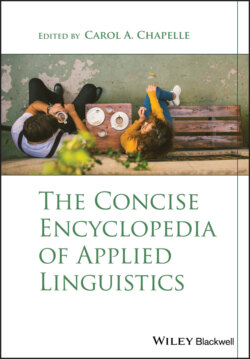Читать книгу The Concise Encyclopedia of Applied Linguistics - Carol A. Chapelle - Страница 40
Agency From Sociocultural Perspectives
ОглавлениеThe goal of sociocultural analysis is to understand how human cognition is related to cultural, institutional, and historical contexts (Wertsch, 1991). To account for agency from sociocultural perspectives, the Vygotskyan theory of mediation, the internalization of self‐regulation, and, more broadly, activity theory as well as the notion of community of practice are taken up in this section.
According to Vygotsky (1997), all forms of higher mental functions are derived from interpersonal interactions mediated by culturally constructed auxiliary tools, whether physical or symbolic, with language as an example of the latter. While physical tools such as a hammer or scissors “extend the reach and power of our bodies” resulting in “a change in the object toward which they are directed” (Lantolf & Thorne, 2006, p. 60), linguistic artifacts are inwardly directed, with the goal of self‐regulation. At first, children are dependent on assistance from adults when they perform certain tasks, often with linguistically mediated support. Through dialogic interactions with others, children learn to self‐regulate their physical and mental activities using mediational devices, and they gradually become independent of adult guidance. This process enhances the child's agency. In this sense, agency refers to internalized self‐regulation, or “the socioculturally mediated capacity to act” (Ahearn, 2001, p. 112). Further, as Newman and Holzman (1993) argue, uniquely human activity mediated by culturally created tools is transformative as well as creative as humans constantly make changes in emerging activities. In this sense, agency refers to the mediated capacity of humans to create and make changes.
Extending these perspectives to L2 learning, SLA researchers often examine L2‐mediated private speech (externalized inner speech) as well as dialogic interactions between L2 learners and teachers in order to understand the process of how learners learn to self‐regulate their second language use and how they mediate their thoughts through a second language by, for example, using concepts learned in the L2.
Activity theory is a framework that permits the study of human practices as developmental processes (Lantolf & Thorne, 2006). From this perspective, activity is seen as social practice that provides conditions for psychological development. In everyday situations, human beings respond to tensions, contradictions, and problems that to some extent change the conceptual, social, and material conditions of their lives. In this sense, tensions, contradictions, and problems create opportunities for human development, often through the creation of new artifacts. While Vygotsky created a model of individual goal‐oriented, mediated activity that generates higher mental functions, later theorists such as Leont'ev (1981) stressed the roles community, rules, and labor‐sharing play in structuring this activity. Lantolf and Pavlenko (2001) argue for the importance of using the activity theory framework in discussing agency in SLA. They stress that second language acquisition as activity is “more than the acquisition of forms”; rather, it is about developing “new ways of mediating ourselves and our relationships” (p. 145) with the world. This perspective requires us to respect learners' agency in “constructing the terms and conditions of their own learning” (p. 145) within the social context in which they are placed.
In Lave and Wenger's (1991) theory, learning is regarded as a situated activity amounting to legitimately participating in a “community of practice” in which an individual is mediated not only by material and symbolic tools but also by the formation of social relationships that are emergent and contingent. Learning thus involves changing relationships as well as transforming identities within one's social world.
Agency from the sociocultural perspective is “never a ‘property’ of a particular individual: rather, it is a relationship that is constantly co‐constructed and renegotiated with those around the individual and with the society at large” (Lantolf & Pavlenko, 2001, p. 148). In this sense, agency is a “culturally (in)formed attribute whose development is shaped by participation in specific communities of practice” (Lantolf & Thorne, 2006, p. 239).
